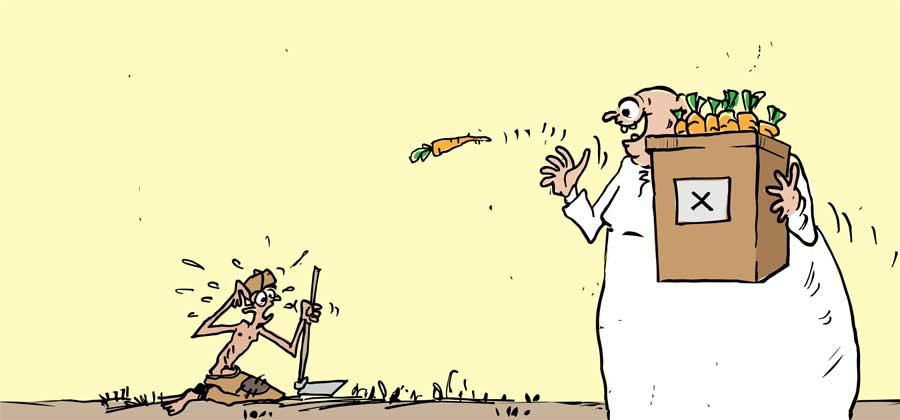Reply To:
Name - Reply Comment

Sri Lankans are mulling over two things right now; one is when the LG polls would be held and the other is how to purchase paddy for the next season.
The latter is of course a problem for the government to solve because there is an agriculture minister appointed to deal with challenges relating to cultivation. In fact Agriculture Minister Mahinda Amaraweera has said that LG polls should be cancelled. He wants the monies set aside for this election to be given to his ministry to purchase paddy.
According to Dr. Ajith Samarakoon (An MBBS doctor), who wrote a comprehensive article on the Sri Lankan paddy farmer recently to a Sinhala Friday publication, Sri Lanka’s lawmakers have continued with their cunning plans to keep the paddy farmers in a poverty-stricken state and obtain their votes.
In Sri Lanka there are about 8 million total farmers; out of which 2.2 million are engaged in paddy cultivation. The contribution to the Gross Domestic Product (GDP) from all types of farming –including paddy-is just 7%. This doesn’t speak much about their contribution to the national economy given that farmers alone comprise 26% of the total work force of this island.
One of the biggest drawbacks for paddy cultivation is the lack of genuine support by the government to paddy farming. Unlike in other countries, where members of the farming community enjoy affluent lifestyles, the Sri Lankan Government wishes the farming community to remain a failed and desperate workforce. We can remember once how lawmaker Ranil Wickremesinghe (Before becoming president) wanted youth farmers to dress up in denims; with all good intentions of raising their image and lifestyle. That was one of his election campaigns. The result was heavy defeats for Wickremesinghe in all agriculture dominated districts. The winner was none other than Mahinda Rajapaksa.
Many of our presidents in the past used photos of themselves in paddy fields and with farmers and derived the best results at elections. But the irony of all that success is that lawmakers have elevated their lives to comfortable heights, while ensuring that the farmer remains poor and dependent on government fertilizer and on aid given to them during disasters like droughts, floods and insect invasions.
If one takes into consideration the lives of farmers in the tea, rubber, vegetables, spices and paddy industries the lives of those in the latter is at a low ebb. As kids we read in newspapers that more paddy farmers committed suicide consuming pesticides compared to farmers engaged in the cultivating of other crops.
Paddy farmers cannot be fooled by promising them denims, smartphones and other luxuries. Neither can their lifestyles be raised by shifting a centuries-old paddy cultivation from chemical farming to organic farming. Experts in the agriculture industry have constantly underscored the fact that Sri Lanka must reconsider the worth of the time and finances invested in keeping alive the tradition of paddy cultivation. These experts demand scientific thinking to improve agriculture crops. In the times of the kings and during the time of the Bandaranaikes paddy cultivation was producing a top harvest because there was support from the palace or the state for agriculture. In 1950 the contribution to the GDP through paddy farming was 47%.
Agriculture experts point out that even though Sri Lanka increases its land area for paddy cultivation by three fold there won’t be much of a difference to the overall equation of Gross National Income. One fact that supports the thinking of crop experts is because right now the crop lost from all sorts of farming in Sri Lanka due to wastage is 52%. Hence should Sri Lanka seriously consider moving to other cop cultivation if they are to do justice to the workforce engaged in paddy cultivation?
The Sinhala radical nationalists of this country were quick to pounce on a doctor employed in Kurunegala saying that he was involved in abortion operations which resulted in making Sinhalese mothers barren. All these accusations proved to be false. The sad part of our history is that no one complained that former president Gotabaya Rajapaksa made our paddy cultivation barren by introducing organic farming in haste.